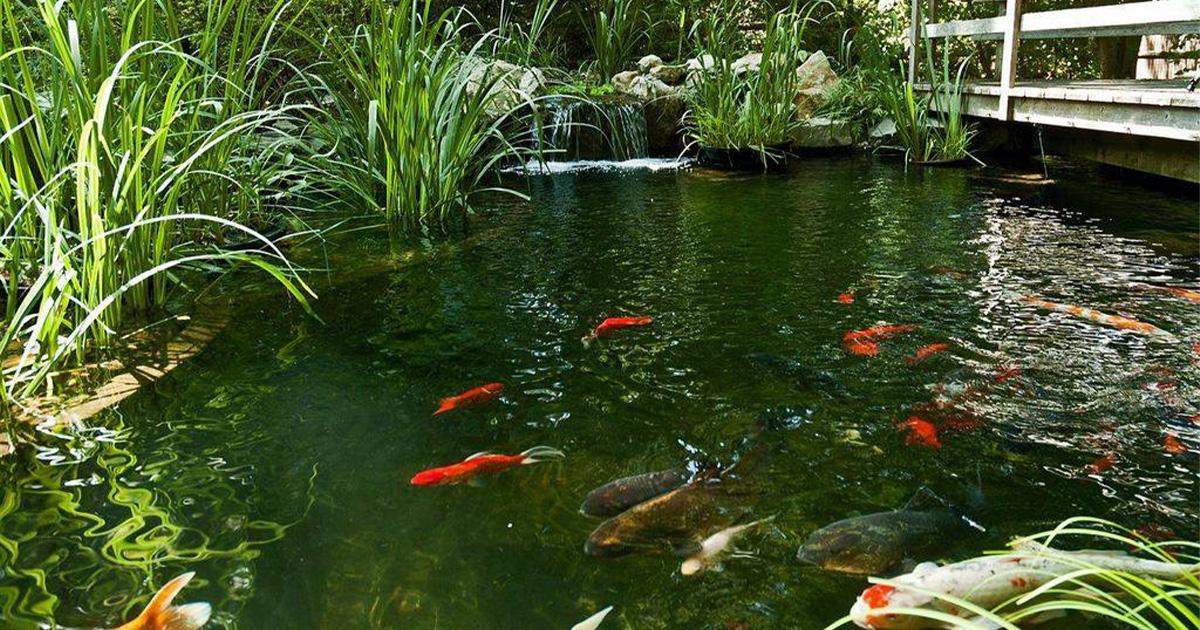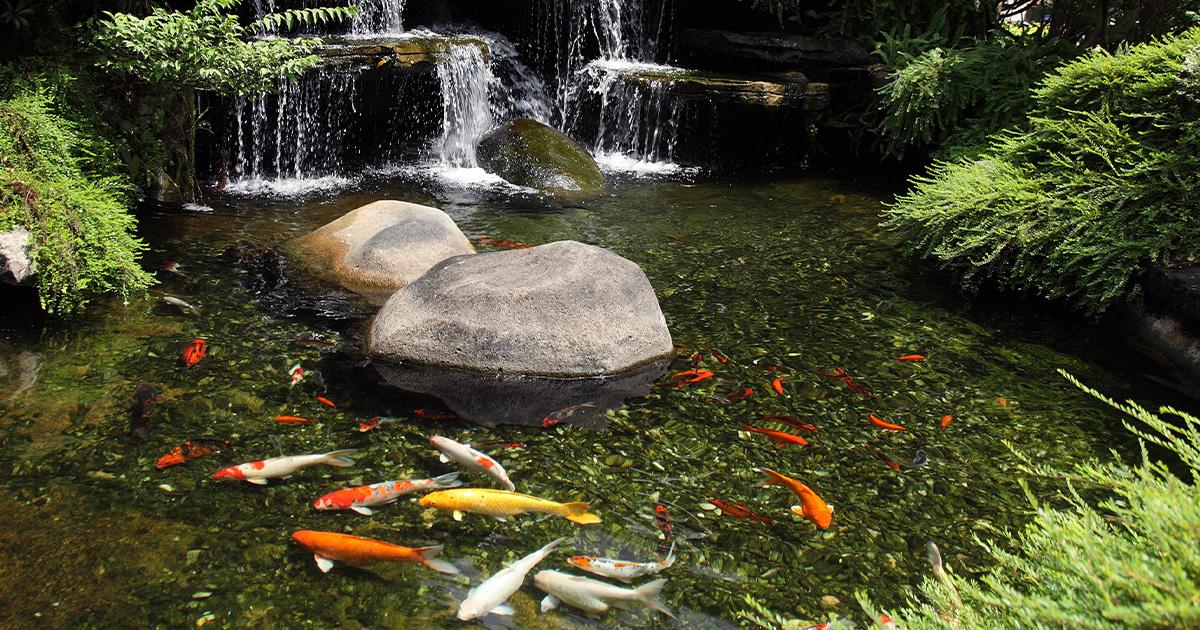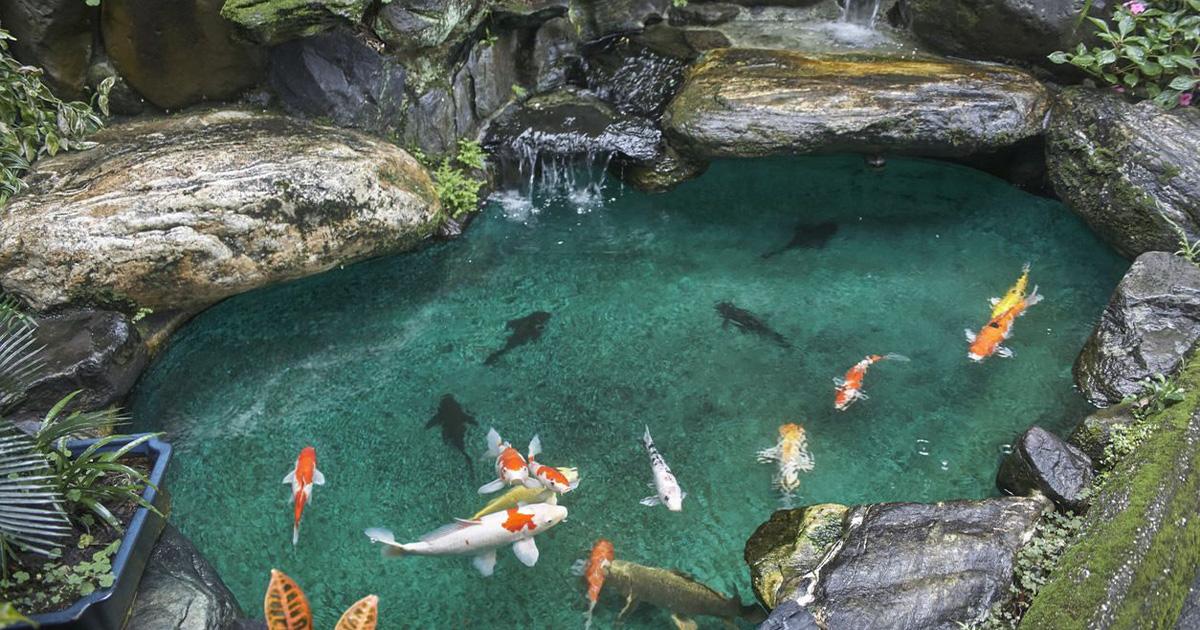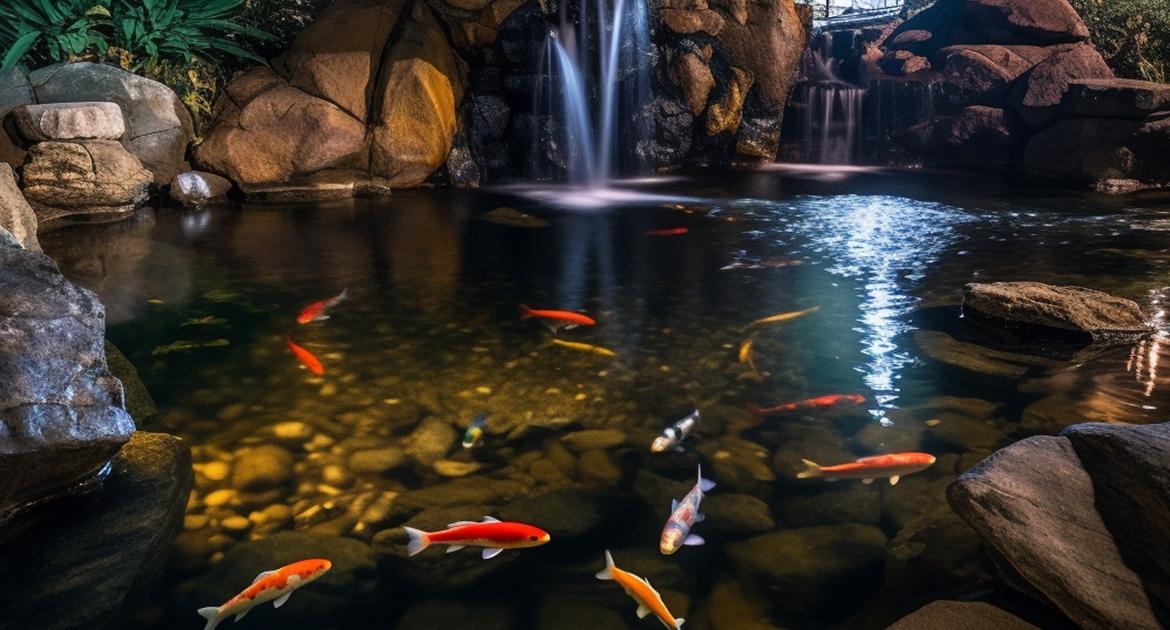(Podcast Episode)
How often should you change the water in a koi pond?
Welcome to our blog! Suppose you’re a proud backyard koi pond owner, or a koi fish enthusiast. In that case, you must know how crucial it is to create a healthy living environment for these magnificent creatures.
Water management is vital to maintaining a thriving koi fish pond, particularly understanding how often you should change the water.
This article will delve into this topic, providing valuable insights into the optimal frequency for water changes in your koi fish pond. So, let’s dive in!

Understanding the Importance of Water Changes
Water quality is crucial to your koi fish’s overall health and well-being. Regular water changes are essential for maintaining optimal water parameters such as pH levels and dissolved oxygen and removing accumulated waste, debris, and excess nutrients. Clean and fresh water helps to prevent the buildup of harmful substances and provides a suitable habitat for your beloved koi.
Factors Influencing Water Change Frequency
Various factors influence how often you should change the water in your koi fish pond. Let’s take a look at the most significant ones:
Pond Size and Stocking Density
Your koi fish pond size and the number of koi fish it houses are vital considerations. Generally, larger ponds with fewer fish require less frequent water changes, as they naturally have more water to dilute waste. On the other hand, smaller ponds or those with a higher stocking density may require more frequent water changes to maintain water quality.
An efficient filtration system is crucial in maintaining the water quality in your koi pond. A properly functioning filter helps remove debris, excess nutrients, and harmful substances, reducing the frequency of water changes. Regular maintenance of your filtration system is necessary to ensure its optimal performance.

Feeding Habits
Koi fish are notorious for their healthy appetite. The more you feed them, the more waste they produce. Overfeeding can lead to excessive debris buildup in the water, necessitating more frequent water changes. It’s essential to strike a balance and feed your koi fish appropriately.
Recommended Water Change Frequency
While the frequency of water changes can vary based on individual circumstances, a general guideline for a well-maintained koi fish pond is to change approximately 10-20% of the water every 1-2 weeks. This frequency allows for regularly removing accumulated waste and helps maintain stable water parameters.
However, monitoring the water quality regularly using test kits is essential. If you notice any changes in water parameters or if the water appears cloudy, foul-smelling, or has excessive algae growth, you should temporarily increase the frequency of water changes.
Pro Tips for Water Change Success
Here are a few more pointers to assist you in successfully changing the water in your koi pond:
- Use a de-chlorinator: Tap water often contains chlorine and chloramine, which can harm your koi. Before adding fresh water to the pond, please treat it with a suitable de-chlorinator to neutralize these chemicals.
- Partial water changes: Opt for partial water changes instead of completely draining the pond. This method helps maintain a more stable environment for your koi, reducing stress levels.
- Siphon the debris: Before adding fresh water, siphon off any visible debris, uneaten food, or waste from the bottom of the pond. This simple step helps keep the water cleaner for a more extended period.
Seasonal Considerations
Seasonal changes can influence the frequency of water changes. During warmer months, koi fish are more active and consume more food. Consequently, it may require frequent water changes to maintain optimal water conditions. When koi fish are less active and eat less during colder months, there is a reduction in water changes.

Water Testing and Monitoring
Regularly testing the water parameters is crucial for maintaining a healthy koi fish pond. Invest in a reliable water testing kit to monitor essential factors like ammonia, nitrite, nitrate levels, and pH. By regularly checking these parameters, you can proactively address water quality issues and adjust the frequency of water changes accordingly.
Observing Koi Behavior
The behavior of your koi fish can provide valuable insights into the water quality. It might indicate poor water conditions if you notice signs of stress or unusual behavior, such as lethargy, loss of appetite, or excessive mucus production. Consider increasing the frequency of water changes until the behavior returns to normal in such cases.
Water Filtration and Maintenance
Maintaining an efficient filtration system is vital for improving water quality and reducing the frequency of water changes. Clean or backwash the filter media regularly to prevent clogging and optimize its performance. Additionally, ensure proper circulation and aeration in the pond to keep the water well-oxygenated and reduce the accumulation of debris.
Additional Water Management Techniques
In addition to regular water changes, incorporating other water management techniques can help maintain a healthy koi fish pond. These techniques include using beneficial bacteria products to break down waste, adding aquatic plants that absorb excess nutrients, and implementing a UV sterilizer to control algae growth. These methods can complement water changes and contribute to a balanced ecosystem.
Seek Professional Advice
If you’re new to koi keeping or facing persistent water quality issues, don’t hesitate to consult with Midwest Pond Features and Landscape or an experienced koi enthusiast. We offer valuable guidance tailored to your circumstances and help you establish an effective water management routine.
FAQs
How often should the water in my koi pond be changed?
The frequency of water changes in a koi pond can vary depending on pond size, stocking density, filtration system, and feeding habits. As a general guideline, changing approximately 10-20% of the water is recommended every 1-2 weeks.
However, monitoring the water quality regularly using test kits and adjusting the frequency is essential. Factors like seasonal changes, water parameters, and koi behavior can also influence the need for more frequent or less frequent water changes.
Is it necessary to completely change the water in my koi pond?
In most cases, complete water changes in a koi pond are unnecessary and can disrupt the ecosystem. Partial water changes, where you replace 10-20% of the water, are generally sufficient for maintaining water quality. A complete water change can cause stress to the koi fish, as it disturbs their established environment.
However, there might be situations where a complete water change is required, such as in cases of severe water quality issues or disease outbreaks. We recommend consulting with a professional or experienced koi keeper before considering a complete water change to ensure it is necessary and done correctly.
Final Words
Caring for your koi fish pond and keeping your fish happy and healthy is rewarding. Remembering to change the water regularly, based on factors like pond size and the number of fish, is crucial.
Following the recommended guidelines and monitoring the water quality can create a clean and safe environment for your koi to thrive.
Remember to observe your fish’s behavior and seek professional advice if needed. Proper filtration and maintenance can reduce the frequency of water changes and maintain a balanced ecosystem.
So, keep up with the routine, enjoy the serene beauty of your koi fish pond, and watch your fish gracefully swim in their little paradise. Happy koi keeping!

